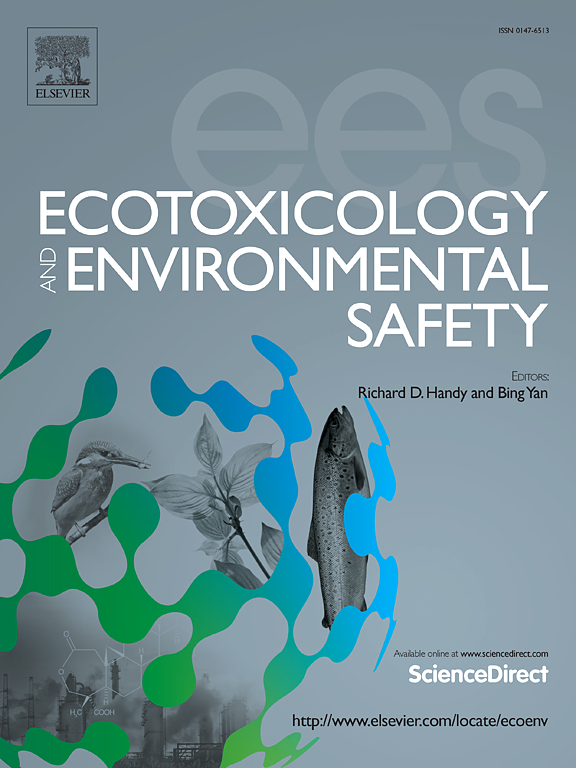化学污染的直接和间接影响:杀真菌剂改变了淡水食腐动物 Asellus aquaticus 的生长、摄食和色素沉着。
IF 6.2
2区 环境科学与生态学
Q1 ENVIRONMENTAL SCIENCES
引用次数: 0
摘要
杀真菌剂等人为化学污染物对自然生态系统构成了重大威胁。尽管在简单的环境背景下,许多化学物质的直接影响已被充分证明,但人们对其间接影响却知之甚少。本研究利用两个个体水平的实验室实验来评估杀真菌剂对等脚类动物 Asellus aquaticus 的直接和间接影响,Asellus aquaticus 是淡水系统中的一种关键性食腐动物。首先,对三种广泛使用的杀菌剂(氟啶胺、戊唑醇、尿素)进行了范围测定,结果表明戊唑醇对水蚤的生长和食物消耗具有最强的浓度依赖性负面影响。其次,一项使用戊唑醇的因子实验评估了戊唑醇的直接影响和食物介导的影响,结果表明,戊唑醇通过这两种途径减少了生长、摄食和色素沉着。结果表明,仅评估有毒化学物质的直接影响可能会忽略与自然系统相关的重要相互作用,如与饮食相关的相互作用。我们的研究强调了在环境毒理学中考虑直接和间接影响的重要性,以便更好地了解化学污染物在自然界中的全面影响。本文章由计算机程序翻译,如有差异,请以英文原文为准。
Direct and indirect effects of chemical pollution: Fungicides alter growth, feeding, and pigmentation of the freshwater detritivore Asellus aquaticus
Anthropogenic chemical pollutants, such as fungicides, pose significant threats to natural ecosystems. Although the direct impacts of numerous chemicals are well-documented in simple environmental contexts, their indirect impacts are poorly understood. This study used two individual level laboratory experiments to assess direct and indirect effects of fungicides on the isopod Asellus aquaticus, a keystone detritivore in freshwater systems. First, a range-finding assay on three widely used fungicides (Fluazinam, Tebuconazole, Urea) showed that Tebuconazole had the strongest concentration-dependent negative effects on A. aquaticus growth and food consumption. Second, a factorial experiment using Tebuconazole assessed its direct and diet-mediated effects and showed that Tebuconazole reduced growth, feeding, and pigmentation through both pathways. The results indicate that assessing only direct impacts of toxic chemicals could overlook critical interactions that are relevant in natural systems, such as those associated with diet. Our study highlights the importance of considering both direct and indirect effects in environmental toxicology to better understand the full impacts of chemical pollutants in nature.
求助全文
通过发布文献求助,成功后即可免费获取论文全文。
去求助
来源期刊
CiteScore
12.10
自引率
5.90%
发文量
1234
审稿时长
88 days
期刊介绍:
Ecotoxicology and Environmental Safety is a multi-disciplinary journal that focuses on understanding the exposure and effects of environmental contamination on organisms including human health. The scope of the journal covers three main themes. The topics within these themes, indicated below, include (but are not limited to) the following: Ecotoxicology、Environmental Chemistry、Environmental Safety etc.

 求助内容:
求助内容: 应助结果提醒方式:
应助结果提醒方式:


